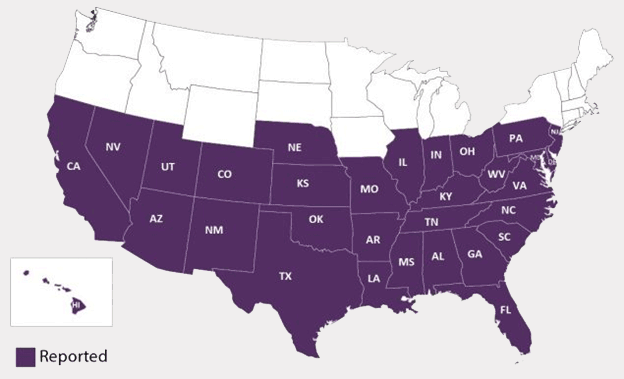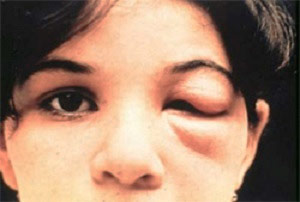
Chagas disease is a potentially serious disease spread by triatomine bugs ("kissing" bugs). Early diagnosis is important to prevent long-term disease.
Chagas disease is a condition caused by the parasite Trypanosoma cruzi, found manly in rural areas of Mexico and Central and South America. Triatomine bugs can carry this parasite and infect people and animals.
In the U.S., Chagas disease is spread by triatomine bugs as well as by blood transfusion, organ transplants, and from pregnant women to their babies. An estimated 280,000 people in the United States are infected, often without knowing it.
Without treatment, Chagas disease can be life-threatening. While early symptoms can be mild, chronic infection can lead to serious heart and digestive system issues.
On This Page
See Also
How It Spreads
- The triatomine bug bites and sucks blood from infected animals or people. T. cruzi parasites in the blood then enter the bug.
- Triatomine bugs in homes emerge during the night to feed when the inhabitants are sleeping. Because they tend to feed on people's faces, triatomine bugs are also known as "kissing bugs."
- After they bite and ingest blood from a sleeping person, they defecate on the person, leaving small particles of feces.
- The person then becomes infected when the T. cruzi parasites in the bug droppings enter the body through a cut or through soft tissues near the eyes or mouth (mucous membranes).
- A person may also become infected by accidentally scratching or rubbing the feces into the bite wound, eyes or mouth.
Although rare, you can also become infected from:
- Mother-to-baby during pregnancy(congenital)
- Contaminated blood products (transfusions)
- An organ transplanted from an infected donor
- Consuming uncooked food contaminated with feces from infected bugs
Chagas disease does not spread from person to person. It does not spread through casual contact with people or animals who are infected.
Risk Factors
If a family member has Chagas disease, you and your family should consider testing in case you were exposed to infection in the same way. For instance:
- You also live in areas where triatomine bugs are common.
- You ate the same food which may have been contaminated with triatomine bug droppings.
- You are a young child or infant, and your mother was diagnosed or infected.
Prevention
You may come in contact with infected kissing bugs if you are traveling or visiting rural areas that might have Chagas disease. When visiting places like Mexico, Central America and South America, where Chagas disease is more common, you should be sure to:
- Stay in well-built places (air-conditioned or screened hotel rooms). This will decrease the risk of contact with infected kissing bugs, which often live in poorly-built dwellings.
- Spray the places where you're staying with long-lasting insecticides.
- Sleep under bed nets treated with long-lasting insecticide.
- Wear clothing that covers your skin and use bug spray on skin that is exposed.
- Do not eat salads, raw vegetables, unpeeled fruit or drink unpasteurized fruit juices.
To reduce the risk of transmission to animals and humans in the United States:
- Keep yard and kennel areas clean. To get rid of habitats for triatomine bugs, remove brush piles, rock piles, excessive buildup of leaf litter, etc.
- Control rodents to remove a potential food source that may sustain populations of bugs in the yard.
- Turn off outdoor lights at night so that bugs aren't attracted to the house and yard.
- Identify and seal off entry points for the bugs into the home and consider the appropriate use of a long-lasting insecticide.
- Keep pet food and water bowls inside to prevent contamination with feces from the infected bugs.
- Keep dog houses and poultry coops clean, fill in crevices where the bugs might hide, and consider the appropriate use of long-lasting pesticides in and around these structures.
There are no vaccines or drugs that can prevent Chagas disease at this time.
Where Triatomine (Kissing) Bugs Are Found
Triatomine bugs are found in the southern United States, Mexico, Central America, and South America. Eleven different species of triatomine bugs have been found in the southern U.S.:

Triatomine bugs can live both indoors and outdoors. Indoors, they can be found in cracks and holes of poorly constructed houses. Outdoors, they can live beneath porches, between rocky structures, in rodent nests, in outdoor dog houses, or in chicken coops.
Signs and Symptoms
Chagas disease has two stages. The first stage, called the acute phase, happens shortly after infection. The second stage, known as the chronic phase, occurs over a long period of time. In both stages, some people might not feel sick at all, while others can have serious health problems.
The acute phase happens in the first weeks or months after being infected. Symptoms are often mild (or not present) and can include:
- Fever
- Feeling tired
- Body aches
- Headache
- Rash
- Loss of appetite
- Diarrhea
- Vomiting
- Romaña's sign (swollen eyelid)
(This happens when the T. cruzi parasite gets into the eyelid, usually by accidentally rubbing the bug feces into the eye or into a bug bite near the eye.)

The chronic phase can last many years or a lifetime. Most people have no symptoms during this time. However, about 20-30% of those infected develop serious problems that can include:
- Heart issues, such as an enlarged heart, heart failure, altered heart rhythm, or sudden death.
- Digestive problems, such as an enlarged esophagus or colon, leading to trouble eating or going to the bathroom.
Diagnosis
Only a healthcare provider can diagnose Chagas disease. If you have symptoms of Chagas disease, talk with your healthcare provider, especially if you have traveled to an area where Chagas disease is widespread. Your provider can arrange blood testing to confirm Chagas disease. (The Mississippi State Department of Health does not perform testing for Chagas disease.)

